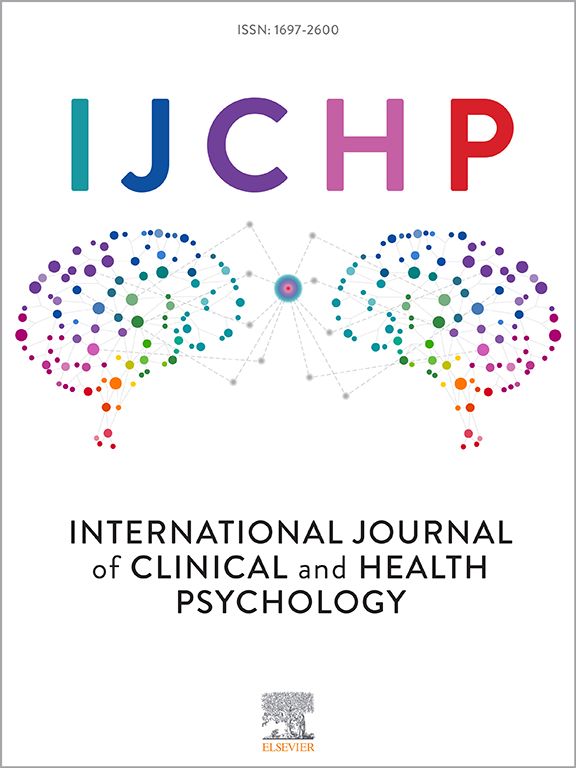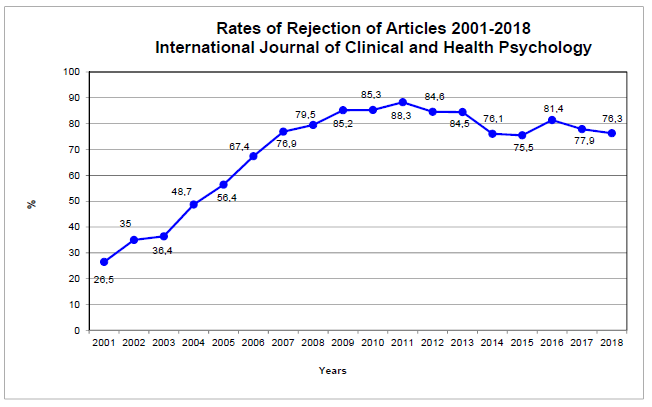Starting with this issue, a new team will take over the editorial responsibilities of the International Journal of Clinical and Health Psychology (IJCHP). During the last two decades, what was mostly a local journal with an international ambition, has become a truly global publication. The number of downloaded articles during the last five years illustrates that IJCHP's readership reaches across continents and countries (see Figure 1).
We are indebted to the previous editors, Juan Carlos Sierra and Gualberto Buela-Casal, for their achievements in bringing IJCHP to a prestigious position among clinical and health psychology journals. In taking this next step, we will continue their hard work, and with the professionalism and expertise of our advisory board, continue to expand the reach and status of IJCHP.
IJCHP is ranked in the first third of the first quartile of clinical psychology journals with an impact factor of 5.350 (JCR). Even more impressive is the steady increase in ranking for the last five years, moving from 33rd in 2016 among 121 psychology journals, to the current 14th position among 131 (see Figure 2). IJCH, with 11% acceptance rate, is one of the most selective journals in the field.
For the last two decades IJCHP has witnessed the inception of clinical and health psychology as an empirical and evidence-based practice. IJCHP was launched a few years after the establishment of the fist Task Force for the identification of empirically validated treatments (latter called “supported”; Chambless & Ollendick, 2001). Along with other clinical psychology publications, IJCHP's contribution to empirical and evidence-based practice was significant and led to important clinical innovations.
A bibliometric study on the content of IJCHP articles for the first decade, showed that the majority of studies followed an ex post facto design (no manipulation of the independent variable) attesting to the initial programmatic objective of researching evidence based practices (Zych & Quevedo-Blasco, 2011).
Even though no bibliometric analysis was undertaken of articles published during the second decade of IJCHP, we believe that significant progress was made in increasing the number of studies with quasi-experimental and experimental designs. Indeed, after two decades of steady progress dedicated to the development of empirically supported treatments, clinical and health psychology, not unlike other health domains, is facing the challenge of moving from an empirical towards a science-based practice. Stated differently, we now know “what works” but our knowledge of “why it works” remains rudimentary (Kazdin, 2007). As appropriately noted by Hofmann and Hayes (2018), the question we currently face is “What core biopsychosocial processes should be targeted with this client given this goal in this situation, and how can they most efficiently and effectively be changed?”(p.38).
We believe that in order to fully address the “why it works” and draw important translations for clinical practice, clinical and health psychology may benefit from increasing the quantity and quality of experimental research (e.g., basic psychology, neuroscience). During the last few years, several prestigious clinical journals have been addressing the need for translating basic psychology (Stice & Jansen, 2018) and neuroscience (Gonçalves & Perrone-McGovern, 2014) into clinical practice. Experimental research in psychology and neurosciences may contribute to a more comprehensive and integrative approach to psychopathology (Michelini, Palumbo, DeYoung, Latzman, & Kotov, 2021), psychotherapy (Månsson, Lueken, & Frick, 2021), health psychology (Berkman, 2018), and neuropsychology (Bigler, 2019).
In starting IJCHP's third decade, this is the direction that we want to undertake as the new editorial team – towards a neuro(science)-based clinical and health psychology. While maintaining methodological pluralism and welcoming submissions with a diversity of studies contributing to the advancement of clinical and health psychology, we are now specifically calling for experimental and quasi-experimental contributions reflecting the translational impact of basic psychological science and neuroscience research across four core domains: clinical psychology and psychotherapy, psychopathology, health psychology and neuropsychology (see Figure 3).
In order to face the challenges ahead of us, and keep on with the tradition of affirming IJCHP as a science-based periodical paving the way for clinical innovations, the scope of the editorial and advisory boards was extended to include renown scientists with expertise on translational science research. Importantly, toward the just goal of including research from all continents, IJCHP now has a representative advisory board with scientists from 17 different countries representing Africa, Asia, Europe, Oceania, North America, and South America (see Figure 4).
A final word to acknowledge the work of all the authors whose work has been featured in IJCHP during last two decades. The success of IJCHP is their success as well. We count on them to continue submitting their best work to IJCHP, as we also encourage a new generation of bright promising scientists to join our selective group of authors.













